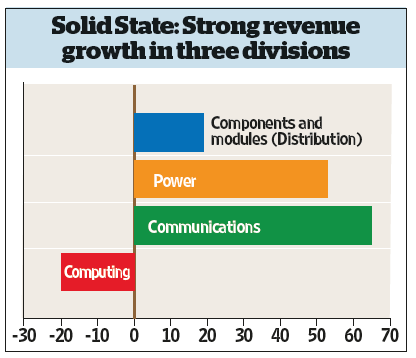Here's what next bear market could do to heavily discounted investment trusts
14th September 2018 11:27
by Fiona Hamilton from interactive investor
Share price discounts to net asset value have narrowed dramatically over recent years and are now increasingly vulnerable to market downturns. Fiona Hamilton discusses possible outcomes.

Investment trusts have had a great run over the past 10 years. The MSCI World index gained 195% over the period, and many investment trusts performed even better.
The weighted average net asset value total return (NAVTR) for the sector (excluding 3i and venture capital trusts) was 205.6%, and the weighted average share price total return (SPTR) was more impressive still at 236%, according to Association of Investment Companies figures to 29 July 2018.
There is disagreement as to why the sector has outperformed both the MSCI index and the average for open-ended companies since the global financial crisis.
Factors mentioned include sector composition (the closed-ended sector's greater ability to invest in smaller companies and to take a long-term view, for example), the effect of gearing into a rising market, skilful management under the watchful eye of well-informed boards, and the impact of extensive share buybacks at sizeable discounts, especially in the first years of the past decade.
However, there can be no quibbling about why the sector's 10-year SPTR has been better than its NAVTR. It is self-evidently a consequence of discount tightening.
Discount squeeze
The average discount for the closed-ended sector excluding private equity, hedge funds and direct property funds was around 9% in mid-2008, approached 14% in March 2009 and then tightened progressively to around 3.5% in early 2016.
It widened to 8% following the Brexit vote and Donald Trump's election as US president. However, it has fallen back to low single figures as indices – including the FTSE 100 – have kept hitting new highs.
As the table below – Sector discounts and 1-yr ranges – shows, this has been particularly evident in equity sectors such as global growth, Japan and UK smaller companies, where average discounts ended July close to 1, 4 and 9% respectively.
As a result, their 10-year weighted average SPTRs have been 20, 16 and 17% better than their average 10-year NAVTRs.
In contrast, global emerging market trusts have seen relatively poor 10-year NAV returns exacerbated by widening discounts, and therefore even more disappointing SPTRs.
In some non-equity sectors the contraction in discounts compared with 10 years ago has been even more marked, with private equity trusts recovering from extreme discounts in the wake of the financial crisis, while direct UK property trusts and especially UK property specialists have in many cases moved to premium ratings.
As a result, their relatively dull 10-year average SPTRs have been significantly boosted.
So where do we go from here? With the average discount having tightened so much, there must be more downside than upside, as has already been evident in sectors considered vulnerable to a US-led trade war: average discounts on European trusts and country specialists in Asia Pacific have recently fallen back to 6.5 and 13% respectively.

Past performance is not a guide to future performance
If there is a steep and generalised sell-off on the scale widely predicted by such perennial bears as Peter Spiller at Capital Gearing trust and Robin Angus at Personal Assets trust, discounts in many other sectors are liable to follow suit.
Add in a fall in NAVs, in some cases exacerbated by gearing into a falling market, and share price setbacks in the worst-affected trusts could be very painful. So investors who suspect the long bull market is riding for a fall should consider their options.
Jean Matterson has extensive experience of the sector, initially as a fund manager and subsequently as chief investment officer at Rossie House Investment Management and as a director at BlackRock Throgmorton, Capital Gearing and Pacific Horizon. She thinks discounts could stretch to double figures if markets start falling with no bottom in sight.
Around 40 investment trusts are committed to using share buybacks to defend stated discount targets, mostly of between zero and 10%. Matterson thinks this may help support their shares in a crisis, particularly if, like Mid Wynd International, they have been conscientious in fulfilling their discount control promises.
However, quite a few trusts have recently failed to keep their discounts down to the promised level, and many warn they will only implement their discount controls 'in normal times'. So she expects most boards to be reluctant to buy back shares while a major correction is underway.
Matterson has been considering moving money from trusts on tight discounts to similarly managed open-ended trusts, but she is wary of those with a high proportion of direct private investors, because they have a tendency to panic and get out when markets fall.
Buyback tactic
Andrew Bell is similarly experienced, having been a wealth manager for many years prior to his 2010 move to Witan investment trust as chief executive and portfolio manager (which includes investing up to 10% of assets in specialist collective funds).
Witan deployed share buybacks to help coax its discount down from 12% in 2012 to negligible levels in mid-2014. It relapsed to around 8% in 2016, due to the combined effect of the Brexit vote, Trump's election and Aviva's sale of its sizeable stake in the trust.
However, buybacks of 2.8 million shares in 2017 added 0.5% to the NAV for remaining shareholders and helped lower the discount to 1.6%, where it has held fairly firm.
Bell says:
"It is in shareholders' interests for us to offer liquidity at close to NAV. But if markets become disorderly, it would not be sensible to be the only ones to keep buying in shares at a minimal discount, not least because of the potential impact on the portfolio [forcing the trust to borrow more or sell holdings at disadvantaged prices]."
Regarding the rest of the sector, Bell expects a big sell-off to precipitate widening discounts on trusts with no history of active buybacks, and on those most vulnerable to the main cause of the downturn.
Private equity trusts, for example, are likely see their discounts widen on fears of a recession, because their heavily leveraged holdings will come under pressure in a less buoyant economic climate; real estate trusts look similarly vulnerable, because their portfolios could suffer from rising voids, and many have a lot of borrowings.
He suspects that debt funds may also struggle, as their assets tend to be so illiquid that it will be hard to sell them to fund buybacks. Moreover, some of their holdings will be exposed as 'mirages'.
Simon Elliott, Winterflood Securities' head of research, thinks the sectors most at risk of discount widening are those that have experienced the greatest discount contraction, such as UK smaller companies.
However, he expects trusts that have been cautiously managed and shown a firm commitment to zero discount policies to prove relatively safe havens – notably Personal Assets, Capital Gearing and Ruffer Investment Company.
Elliott notes that global sector giant Scottish Mortgage has been ready to buy back substantial numbers of shares to keep its discount tight in recent setbacks, whereas Alliance Trust has let its discount stray a bit further from its target of 4.75%.
He suggests that, like many others, both trusts could find it hard to control their discounts during a steep setback, but will hopefully bring them back to target as markets settle, so long-term holders should not panic.
Winterflood has been considering switches from trusts on premium ratings such as Foreign & Colonial Investment Trust to less highly rated peers such as Scottish Investment Trust. If they really like a premium rated trust such as Jupiter European Opportunities, they may suggest clients move to its similar open-ended alternative.
Charles Cade at Numis Securities thinks trusts specialising in alternative assets such as debt and property will find it hardest to control their discounts in a major setback, as their holdings are illiquid and their share registers tend to be dominated by institutions.
If the latter want to sell their chunky stakes, it may be difficult to find buyers.
He expects most equity trusts to find it easier, as their holdings are more liquid, and most of these trusts are not highly geared. But those with a lot of unquoted holdings – notably Scottish Mortgage – might have problems.
Cade expects trusts with attractive yields funded from revenue to prove relatively resilient, because of the thirst for income and because their holdings tend to be less volatile than the market (have low beta).
He suspects trusts paying enhanced dividends by funding them partly from capital will prove more vulnerable, because their holdings are less likely to be low beta, and eating into depleted assets to maintain their payouts may look 'less clever'.
Full performance can be found on the company or index summary page on the interactive investor website. Simply click on the company's or index name highlighted in the article.
This article was originally published in our sister magazine Money Observer, which ceased publication in August 2020.
These articles are provided for information purposes only. Occasionally, an opinion about whether to buy or sell a specific investment may be provided by third parties. The content is not intended to be a personal recommendation to buy or sell any financial instrument or product, or to adopt any investment strategy as it is not provided based on an assessment of your investing knowledge and experience, your financial situation or your investment objectives. The value of your investments, and the income derived from them, may go down as well as up. You may not get back all the money that you invest. The investments referred to in this article may not be suitable for all investors, and if in doubt, an investor should seek advice from a qualified investment adviser.
Full performance can be found on the company or index summary page on the interactive investor website. Simply click on the company's or index name highlighted in the article.
These articles are provided for information purposes only. Occasionally, an opinion about whether to buy or sell a specific investment may be provided by third parties. The content is not intended to be a personal recommendation to buy or sell any financial instrument or product, or to adopt any investment strategy as it is not provided based on an assessment of your investing knowledge and experience, your financial situation or your investment objectives. The value of your investments, and the income derived from them, may go down as well as up. You may not get back all the money that you invest. The investments referred to in this article may not be suitable for all investors, and if in doubt, an investor should seek advice from a qualified investment adviser.
Full performance can be found on the company or index summary page on the interactive investor website. Simply click on the company's or index name highlighted in the article.